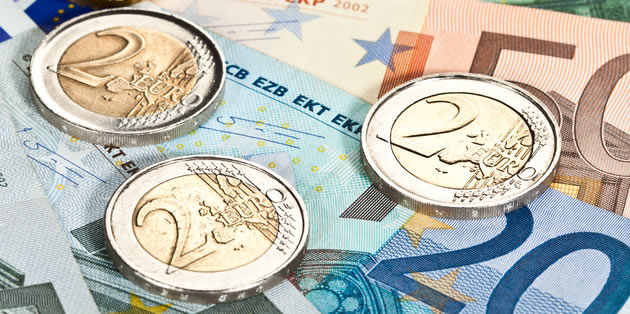The Pound Sterling to Euro (GBP/EUR) exchange rate fluctuated today as Eurozone concerns for Greece resurfaced but were eventually outweighed by positive Eurozone Industrial and GDP data.
Pound Sterling (GBP) Unable to Maintain Growth Against Euro (EUR) Amidst Lack of Positive Domestic Data
The GBP/EUR pair continues to experience turbulence and a lack of sustainable gains, a trend that was present throughout February and looks to continue into March as Britain’s EU Referendum in June draws closer. Currently down on today’s opening levels, the exchange rate has fallen -0.8% to hit a low of 1.2827.
While The Bank of England (BoE)’s Ben Broadbent injected confidence into the Pound last week with his speech on digital currencies, a following slew of mediocre UK data releases prevented Sterling from gaining much over the shared currency.
This morning, the Pound began to fall again after multiple better-than-expected Eurozone data releases. German Industrial Production data showed marked increases of 3.3% in February over January’s -0.3% and a 2.2% annual figure, up from the previous month’s year-on-year result of -1.3%, much more bullish than the respective 0.5% and -1.6% forecasts. Eurozone Gross Domestic Product (GDP) results were also up, with 1.6% over last year’s 1.5% and the Quarterly GDP remaining steady at 0.3% growth.
European Anxiety Dulls EUR Currency Movement as Greece Worries Resurface and Brexit Debates Continue
Expect to hear the EU Referendum discussion come up a lot in the run up to June as the uncertainty surrounding the Brexit seems to be consistently causing Pound Sterling (GBP) movement to be either violent or muted.
Investors may also be choosing to not buy into the Euro despite the Eurozone’s positive growth data as the Greek economic crisis finds itself in the Eurozone news once again. Eurozone finance ministers are continuing discussions on the conditions of the Greek financial bailout which analysts predict may have hit more obstacles due to the current refugee crisis in Europe.
The Troika of international lenders will be visiting Athens again as soon as today to evaluate the current progress of Greece’s economy, however some analysts remain anxious that a Greek exit from the Eurozone could still be on the cards.
Outside of Europe, commodity currencies like the Canadian Dollar (CAD) and Australian Dollar (AUD) continue to increase in appeal due to the price of commodities like oil and iron ore rallying. Many investors are thought to be buying into the commodity bloc while prices are high.
Uncertainty Continues as Investors Anticipate European Central Bank (ECB) Announcements
Despite the Pound (GBP) remaining apathetic to its foreign peers in light of Britain’s economic anxieties, it’s still entirely possible for the Euro (EUR) to weaken depending on this week’s European Central Bank (ECB) announcements.
This Thursday the ECB are fully expected to announce measures to inject more stimulus into the European economy in attempt to boost the Eurozone’s economic recovery following the Eurozone crisis.
The ECB had been attempting to use ‘Quantitative Easing’ (QE) in order to help stimulate growth, but many analysts feel the system has been underwhelming thus far and has caused dovish behaviour in investors – an attitude that will likely continue this week if announcements do not inspire a more bullish market.
The GBP/EUR exchange rate could strengthen or weaken depending almost entirely on the reaction to this announcement, while Brexit and Grexit concerns may keep investors from flocking to either currency – especially if Greece bailout negotiations go sour.
The Pound Sterling to Euro (GBP/EUR) exchange rate is currently trending in the region of 1.2870 while the Euro to Pound Sterling (EUR/GBP) exchange rate trends in the region of 0.7770.



